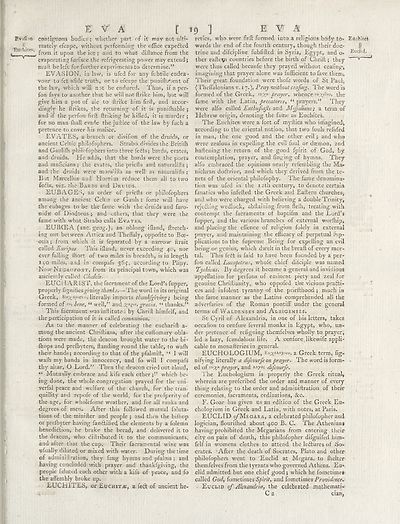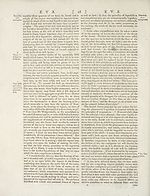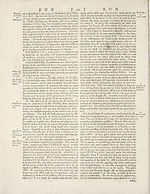Encyclopaedia Britannica > Volume 7, ETM-GOA
(29) Page 19
Download files
Complete book:
Individual page:
Thumbnail gallery: Grid view | List view

E VA [
E.ifi )n contiguous bodies; whether part of it may not ulti-
E I V mateIy e^caPe» v/ithout performing the office expefted
u«. '' '■ from it upon the ice ; and to what diftance from the
evaporating furface the refrigerating power may extend;
muft be left for further experiments to determine.”
EVASION, in law, is ufed for any fubtile endea¬
vour to fet afide truth, or to efcape the pnnilhment of
the law, which will not be endured. Thus, if a per-
fon fays to another that he will not ftrike him, but will
give him a pot of aie to ftrike him firft, and accor¬
dingly he ftrikes, the returning of it is puniftiable ;
and if the perfon firft {hiking be killed, it is murder ;
for no man (hall evade the juftice of the law by fuch a
pretence to. cover Eis malice.
EVATES, a branch or divifion of the druids, or
ancient Celtic philofophers. Strabo.divides the Britiih
and Gaulifti philofophers into three fedfs; bards, evates,
and druids. He adds, that the bards were the poets
and muficians ; the evates, the priefts and naturalifts ;
and the druids were mora’ifts as well as naturalifts
But Marcellus and Hornius reduce them all to two
fedls, viz. the Bards and Druids.
EUBAGE'l, an order of priefts or philofophers
among the ancient Celtce or Gauls: fome will have
the cubages to be the fame with the druids and faro-
nidse of Diodorus ;- and others, that they were the
fame with what Strabo calls Evates.
EUBCEA (anc. geog.), an oblong ifland, ftretch-
ing out between Attica and Theflaly, oppofite to Boe-
otia ; from v/hich it is feparated by a narrow ftrait
called Euripus This ifland, never exceeding 40, nor
ever falling fhort of two miles in breadth, is in length
150 miles, and in conipafs 365, according to Pliny.
Now Negropont, from its principal town, which was
anciently called Chalets.
EUCHARIST, the facrament of the Lord’s fupper,
properly fignifies^iwnj thanks.—The word in its original
Greek, EvXapls-ix, literally imports thmhfgiving} being
formed of w, bene, “ well,” and gratia, “ thanks.”
This facrament was inftituted by Chrift himfelf, and
the participation of it is called communion.
As to the manner of celebrating the eucharift a-
mong the ancient Chriftians, after the cuftomary obla¬
tions were made, the deacon brought water to the bi-
fhops and prefbyters, {landing round the table, to wafh
their hands; according to that of the pfalmift, “ I will
wafli my hands in innocency, and fo will I compafs
thy altar, O Lord.” Then the deacon cried out aloud,
4‘ Mutually embrace and kifs each other;” which be¬
ing done, the whole congregation prayed for the uni-
verfal peace and welfare of the church, for the tran¬
quillity and repofe of the world, for the profperity of
the age, for wholefome weather, and for all ranks and
degrees of men. After this follo'wed mutual faluta-
tions of the minifter and people ; and then the biftiop
or prelbyter having fan&ified the elements by a folemn
benediction, he brake the bread, and delivered it to
the deacon, who diftributed it to the communicants,
and after that the cup.- Their facramental wine was
ufually diluted or mixed with water. During the time
of adminiftration, they fang hymns and pfalms ; and
having concluded with prayer and thankfgiving, the
people fainted each other with a kifs of peace, and fo
the affembly broke up.
EUCHITES, or Euchit^, a fed of ancient he-
19 ] E V A
reties, who were firft formed into a religious body to- Eu.-hite*
wards the end of the fourth century, though their doc- 11
trine and difeipline fubfifted in Syria, Egypt, and o- Ellchd.
ther eaftey1 countries before the birth of Chrift; they ‘ v'~”“
were thus called becaufe they prayed without ceafing,
imagining that prayer alone was fufficient to fave them.
Their great foundation w’ere thofe words of St Paul,
(Theffalonians v. 17.), Pray nvithout esajing. The word is
formed of t he Greek, prayer, whence the
fame with the Latin, precatores, “ prayers.” They
were alfo called Enthujiajls and Mejjalians; a term of
Hebrew origin, denoting the fame as Euchites.
The Euchites were a fort of myftics who imagined-,
according to the oriental notion, that two fouls refided
in man, the one good and the other evil; and who
were zealous in expelling the evil foul or dasmon, and
haftening the return of the good fpirit of God, by
contemplation, prayer, and finging of hymns. They
alfo embraced the opinions nearly refembling the Ma-
nichean do6lrine, and which they derived from the te¬
nets of the oriental philofophy. The fame denomina¬
tion w'as ufed in the 12th century, to denote certain
fanatics who infefted the Greek and Eaftern churches,
and who were charged with believing a double Trinity,
rejecting wedlock, abftaining from flefti, treating with
contempt the facraments of baptifm and the Lord’s
fupper, and the various branches of external worftiip,
and placing the efience of religion folely in external
prayer, and maintaining the efficacy of perpetual Ap¬
plications to the fupreme Being for expelling an evil
being or genius, which dwTelt in the breaft of every mor¬
tal. This feft is faid to have been founded by a per¬
fon called Lucopetrus, whofe chief difciple was named
Tychicus. By degrees it became a general and invidious
appellation for perfons of eminent piety and zeal for
genuine Chriftianity, who oppofed the vicious prafti-
ccs and infolent tyranny of the priefthood ; much in
the fame manner as the Latins comprehended all the
adverfaries of the Roman pontiff under the general
terms of Waldenses and Albigenses.
St Cyril of Alexandria, in one of his letters, takes
oecafion to cenfure feveral monks in Egypt, who, un¬
der pretence of refigning themfelves wholly to prayer,
led a lazy, fcandalous life. A cenfure ,likewifc appli¬
cable to monalteries in general.
EUCHOLOGIUM, Eu^oxoyiov, a Greek term, fig-
nifying literally a difeourfe on prayer. The word is form- •
ed of prayer, and difeourfe.
The Euchologium is properly the Greek ritual,
wherein are preferibed the order and manner of every
thing relating to the order and adminiftration of their
ceremonies, facraments, ordinations, &c.
F. Goar has given us an edition of the Greek Eu-
chologium in Greek and Latin, with notes, at Paris.
EUCLID o/'Megara, a celebrated philofopher and
logician, flouriflied about 400 B. C. The Athenians
having prohibited the Megarians from entering their
city on pain of death, this philofopher difguifed him¬
felf in womens clothes to attend the lectures of So¬
crates. After the death of Socrates, Plato and other
philofophers went to Euclid at Megara, to ftielter
themfelves from the tyrants who governed Athens. Eu¬
clid admitted but one chief good; which he fometime*
called God, fometimes Spirit, and fometimes Providence.
Euclid of Alexandria, the celebrated jnathemati-
C a cian,
E.ifi )n contiguous bodies; whether part of it may not ulti-
E I V mateIy e^caPe» v/ithout performing the office expefted
u«. '' '■ from it upon the ice ; and to what diftance from the
evaporating furface the refrigerating power may extend;
muft be left for further experiments to determine.”
EVASION, in law, is ufed for any fubtile endea¬
vour to fet afide truth, or to efcape the pnnilhment of
the law, which will not be endured. Thus, if a per-
fon fays to another that he will not ftrike him, but will
give him a pot of aie to ftrike him firft, and accor¬
dingly he ftrikes, the returning of it is puniftiable ;
and if the perfon firft {hiking be killed, it is murder ;
for no man (hall evade the juftice of the law by fuch a
pretence to. cover Eis malice.
EVATES, a branch or divifion of the druids, or
ancient Celtic philofophers. Strabo.divides the Britiih
and Gaulifti philofophers into three fedfs; bards, evates,
and druids. He adds, that the bards were the poets
and muficians ; the evates, the priefts and naturalifts ;
and the druids were mora’ifts as well as naturalifts
But Marcellus and Hornius reduce them all to two
fedls, viz. the Bards and Druids.
EUBAGE'l, an order of priefts or philofophers
among the ancient Celtce or Gauls: fome will have
the cubages to be the fame with the druids and faro-
nidse of Diodorus ;- and others, that they were the
fame with what Strabo calls Evates.
EUBCEA (anc. geog.), an oblong ifland, ftretch-
ing out between Attica and Theflaly, oppofite to Boe-
otia ; from v/hich it is feparated by a narrow ftrait
called Euripus This ifland, never exceeding 40, nor
ever falling fhort of two miles in breadth, is in length
150 miles, and in conipafs 365, according to Pliny.
Now Negropont, from its principal town, which was
anciently called Chalets.
EUCHARIST, the facrament of the Lord’s fupper,
properly fignifies^iwnj thanks.—The word in its original
Greek, EvXapls-ix, literally imports thmhfgiving} being
formed of w, bene, “ well,” and gratia, “ thanks.”
This facrament was inftituted by Chrift himfelf, and
the participation of it is called communion.
As to the manner of celebrating the eucharift a-
mong the ancient Chriftians, after the cuftomary obla¬
tions were made, the deacon brought water to the bi-
fhops and prefbyters, {landing round the table, to wafh
their hands; according to that of the pfalmift, “ I will
wafli my hands in innocency, and fo will I compafs
thy altar, O Lord.” Then the deacon cried out aloud,
4‘ Mutually embrace and kifs each other;” which be¬
ing done, the whole congregation prayed for the uni-
verfal peace and welfare of the church, for the tran¬
quillity and repofe of the world, for the profperity of
the age, for wholefome weather, and for all ranks and
degrees of men. After this follo'wed mutual faluta-
tions of the minifter and people ; and then the biftiop
or prelbyter having fan&ified the elements by a folemn
benediction, he brake the bread, and delivered it to
the deacon, who diftributed it to the communicants,
and after that the cup.- Their facramental wine was
ufually diluted or mixed with water. During the time
of adminiftration, they fang hymns and pfalms ; and
having concluded with prayer and thankfgiving, the
people fainted each other with a kifs of peace, and fo
the affembly broke up.
EUCHITES, or Euchit^, a fed of ancient he-
19 ] E V A
reties, who were firft formed into a religious body to- Eu.-hite*
wards the end of the fourth century, though their doc- 11
trine and difeipline fubfifted in Syria, Egypt, and o- Ellchd.
ther eaftey1 countries before the birth of Chrift; they ‘ v'~”“
were thus called becaufe they prayed without ceafing,
imagining that prayer alone was fufficient to fave them.
Their great foundation w’ere thofe words of St Paul,
(Theffalonians v. 17.), Pray nvithout esajing. The word is
formed of t he Greek, prayer, whence the
fame with the Latin, precatores, “ prayers.” They
were alfo called Enthujiajls and Mejjalians; a term of
Hebrew origin, denoting the fame as Euchites.
The Euchites were a fort of myftics who imagined-,
according to the oriental notion, that two fouls refided
in man, the one good and the other evil; and who
were zealous in expelling the evil foul or dasmon, and
haftening the return of the good fpirit of God, by
contemplation, prayer, and finging of hymns. They
alfo embraced the opinions nearly refembling the Ma-
nichean do6lrine, and which they derived from the te¬
nets of the oriental philofophy. The fame denomina¬
tion w'as ufed in the 12th century, to denote certain
fanatics who infefted the Greek and Eaftern churches,
and who were charged with believing a double Trinity,
rejecting wedlock, abftaining from flefti, treating with
contempt the facraments of baptifm and the Lord’s
fupper, and the various branches of external worftiip,
and placing the efience of religion folely in external
prayer, and maintaining the efficacy of perpetual Ap¬
plications to the fupreme Being for expelling an evil
being or genius, which dwTelt in the breaft of every mor¬
tal. This feft is faid to have been founded by a per¬
fon called Lucopetrus, whofe chief difciple was named
Tychicus. By degrees it became a general and invidious
appellation for perfons of eminent piety and zeal for
genuine Chriftianity, who oppofed the vicious prafti-
ccs and infolent tyranny of the priefthood ; much in
the fame manner as the Latins comprehended all the
adverfaries of the Roman pontiff under the general
terms of Waldenses and Albigenses.
St Cyril of Alexandria, in one of his letters, takes
oecafion to cenfure feveral monks in Egypt, who, un¬
der pretence of refigning themfelves wholly to prayer,
led a lazy, fcandalous life. A cenfure ,likewifc appli¬
cable to monalteries in general.
EUCHOLOGIUM, Eu^oxoyiov, a Greek term, fig-
nifying literally a difeourfe on prayer. The word is form- •
ed of prayer, and difeourfe.
The Euchologium is properly the Greek ritual,
wherein are preferibed the order and manner of every
thing relating to the order and adminiftration of their
ceremonies, facraments, ordinations, &c.
F. Goar has given us an edition of the Greek Eu-
chologium in Greek and Latin, with notes, at Paris.
EUCLID o/'Megara, a celebrated philofopher and
logician, flouriflied about 400 B. C. The Athenians
having prohibited the Megarians from entering their
city on pain of death, this philofopher difguifed him¬
felf in womens clothes to attend the lectures of So¬
crates. After the death of Socrates, Plato and other
philofophers went to Euclid at Megara, to ftielter
themfelves from the tyrants who governed Athens. Eu¬
clid admitted but one chief good; which he fometime*
called God, fometimes Spirit, and fometimes Providence.
Euclid of Alexandria, the celebrated jnathemati-
C a cian,
Set display mode to:
![]() Universal Viewer |
Universal Viewer | ![]() Mirador |
Large image | Transcription
Mirador |
Large image | Transcription
Images and transcriptions on this page, including medium image downloads, may be used under the Creative Commons Attribution 4.0 International Licence unless otherwise stated. ![]()
| Encyclopaedia Britannica > Encyclopaedia Britannica > Volume 7, ETM-GOA > (29) Page 19 |
|---|
| Permanent URL | https://digital.nls.uk/189121606 |
|---|
| Attribution and copyright: |
|
|---|
| Description | Ten editions of 'Encyclopaedia Britannica', issued from 1768-1903, in 231 volumes. Originally issued in 100 weekly parts (3 volumes) between 1768 and 1771 by publishers: Colin Macfarquhar and Andrew Bell (Edinburgh); editor: William Smellie: engraver: Andrew Bell. Expanded editions in the 19th century featured more volumes and contributions from leading experts in their fields. Managed and published in Edinburgh up to the 9th edition (25 volumes, from 1875-1889); the 10th edition (1902-1903) re-issued the 9th edition, with 11 supplementary volumes. |
|---|---|
| Additional NLS resources: |
|

